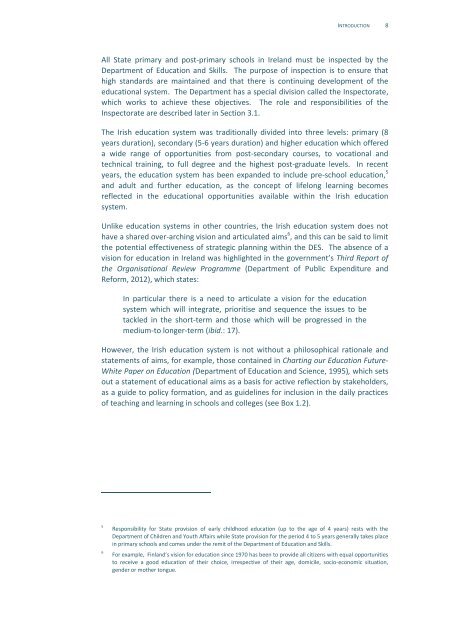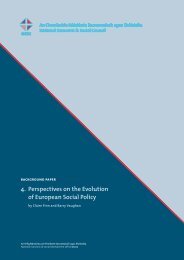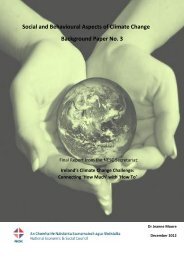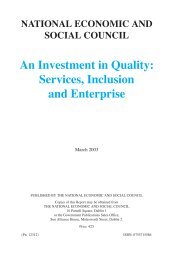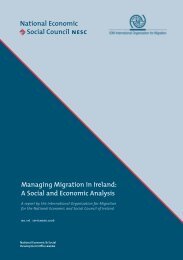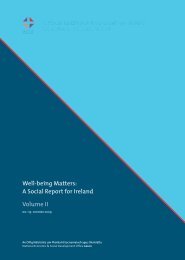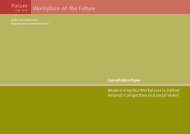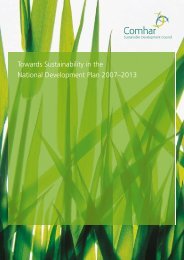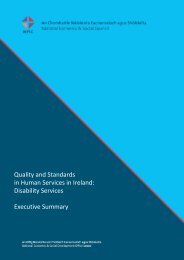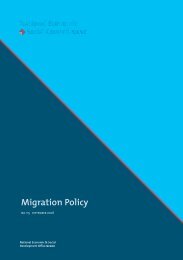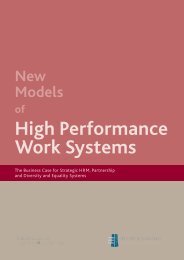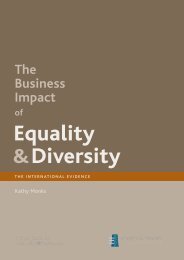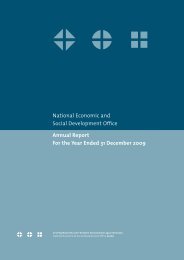Quality and Standards in Human Services in Ireland - the NESC ...
Quality and Standards in Human Services in Ireland - the NESC ...
Quality and Standards in Human Services in Ireland - the NESC ...
Create successful ePaper yourself
Turn your PDF publications into a flip-book with our unique Google optimized e-Paper software.
INTRODUCTION 8All State primary <strong>and</strong> post-primary schools <strong>in</strong> Irel<strong>and</strong> must be <strong>in</strong>spected by <strong>the</strong>Department of Education <strong>and</strong> Skills. The purpose of <strong>in</strong>spection is to ensure thathigh st<strong>and</strong>ards are ma<strong>in</strong>ta<strong>in</strong>ed <strong>and</strong> that <strong>the</strong>re is cont<strong>in</strong>u<strong>in</strong>g development of <strong>the</strong>educational system. The Department has a special division called <strong>the</strong> Inspectorate,which works to achieve <strong>the</strong>se objectives. The role <strong>and</strong> responsibilities of <strong>the</strong>Inspectorate are described later <strong>in</strong> Section 3.1.The Irish education system was traditionally divided <strong>in</strong>to three levels: primary (8years duration), secondary (5-6 years duration) <strong>and</strong> higher education which offereda wide range of opportunities from post-secondary courses, to vocational <strong>and</strong>technical tra<strong>in</strong><strong>in</strong>g, to full degree <strong>and</strong> <strong>the</strong> highest post-graduate levels. In recentyears, <strong>the</strong> education system has been exp<strong>and</strong>ed to <strong>in</strong>clude pre-school education, 5<strong>and</strong> adult <strong>and</strong> fur<strong>the</strong>r education, as <strong>the</strong> concept of lifelong learn<strong>in</strong>g becomesreflected <strong>in</strong> <strong>the</strong> educational opportunities available with<strong>in</strong> <strong>the</strong> Irish educationsystem.Unlike education systems <strong>in</strong> o<strong>the</strong>r countries, <strong>the</strong> Irish education system does nothave a shared over-arch<strong>in</strong>g vision <strong>and</strong> articulated aims 6 , <strong>and</strong> this can be said to limit<strong>the</strong> potential effectiveness of strategic plann<strong>in</strong>g with<strong>in</strong> <strong>the</strong> DES. The absence of avision for education <strong>in</strong> Irel<strong>and</strong> was highlighted <strong>in</strong> <strong>the</strong> government’s Third Report of<strong>the</strong> Organisational Review Programme (Department of Public Expenditure <strong>and</strong>Reform, 2012), which states:In particular <strong>the</strong>re is a need to articulate a vision for <strong>the</strong> educationsystem which will <strong>in</strong>tegrate, prioritise <strong>and</strong> sequence <strong>the</strong> issues to betackled <strong>in</strong> <strong>the</strong> short-term <strong>and</strong> those which will be progressed <strong>in</strong> <strong>the</strong>medium-to longer-term (ibid.: 17).However, <strong>the</strong> Irish education system is not without a philosophical rationale <strong>and</strong>statements of aims, for example, those conta<strong>in</strong>ed <strong>in</strong> Chart<strong>in</strong>g our Education Future-White Paper on Education (Department of Education <strong>and</strong> Science, 1995), which setsout a statement of educational aims as a basis for active reflection by stakeholders,as a guide to policy formation, <strong>and</strong> as guidel<strong>in</strong>es for <strong>in</strong>clusion <strong>in</strong> <strong>the</strong> daily practicesof teach<strong>in</strong>g <strong>and</strong> learn<strong>in</strong>g <strong>in</strong> schools <strong>and</strong> colleges (see Box 1.2).56Responsibility for State provision of early childhood education (up to <strong>the</strong> age of 4 years) rests with <strong>the</strong>Department of Children <strong>and</strong> Youth Affairs while State provision for <strong>the</strong> period 4 to 5 years generally takes place<strong>in</strong> primary schools <strong>and</strong> comes under <strong>the</strong> remit of <strong>the</strong> Department of Education <strong>and</strong> Skills.For example, F<strong>in</strong>l<strong>and</strong>’s vision for education s<strong>in</strong>ce 1970 has been to provide all citizens with equal opportunitiesto receive a good education of <strong>the</strong>ir choice, irrespective of <strong>the</strong>ir age, domicile, socio-economic situation,gender or mo<strong>the</strong>r tongue.


